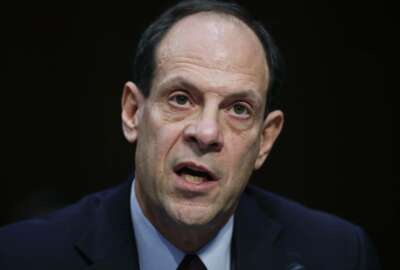
DoD’s acting IG is in his position unlawfully, GAO finds
GAO legal opinion says the appointment of Sean O'Donnell to be acting DoD IG violated the Federal Vacancies Reform Act twice: once under President Trump, and again...
The Pentagon’s acting inspector general is serving in that role without legal authorization, and hasn’t been entitled to hold the job since last November, according to a new legal opinion by the Government Accountability Office.
In the ruling, GAO found the same official, Sean O’Donnell, also served in the position unlawfully for nine-and-a-half months during a separate period at the end of the Trump administration.
GAO made the findings Tuesday in its role as arbiter over the Federal Vacancies Reform Act, a complex and often ambiguous legal regime Congress originally created to limit how long political appointees can serve without earning Senate confirmation. The most recent version was passed in 1998.
In general, the rule is that no appointee can hold an “acting” title for longer than 210 days, though that timeframe can be extended in some circumstances. One of them is when there’s a presidential transition: under a new president, appointees get an extra 90 days, for a total of 300. Under GAO’s interpretation of the statute, Biden’s re-appointment of O’Donnell as acting IG expired on Nov. 15, 2021.
A spokeswoman for the IG’s office said its staff was aware of the GAO ruling and was still reviewing how it would respond.
But the ruling itself indicates the OIG’s interpretation of the Vacancies Act is different from GAO’s. The OIG believed that the law allowed O’Donnell to serve as acting IG under a different exception to the Vacancies Act: one that allows officials to serve in acting capacities while the Senate is considering a different person as their permanent replacement.
And that was the case here: President Biden nominated Robert Storch to be the permanent IG on the same day the 300-day clock expired, and his nomination is still stuck on the Senate floor.
But GAO found the “pending nomination” exception doesn’t apply because of another quirk in the Vacancies Act: it puts the time restrictions on hold the first and second time a president tries to nominate someone to the same position, but after the Senate’s rejected a nomination twice — no matter who the president was — the 210-day clock starts ticking again, and from there, the clock is all that matters.
The OIG’s interpretation appears to have been that the entire process should have reset once a new president took office, giving Biden two more chances to stop the clock by nominating a permanent official. But GAO says that concept simply isn’t in the statute. There hasn’t been a Senate-confirmed DoD IG since January of 2016, and GAO says former President Obama’s two unsuccessful attempts to nominate former acting IG Glenn Fine to the permanent job count toward the two-nomination total.
But the OIG didn’t pull its interpretation out of thin air, said Anne Joseph O’Connell, a Stanford University law professor who has studied and written extensively about the Vacancies Act.
“Most commentators, myself included, and the Department of Justice’s Office of Legal Counsel, thought that everything restarted with the new presidential administration,” she said, “I can’t think of any court case, GAO violation letter or published opinion that takes the position GAO took today. And if you look at executive practice, the practice has also not followed what the GAO ruled today. It’s always thought of the new administration as restarting the vacancy.”
Former President Trump withdrew Fine’s second nomination in February 2017, leaving him with the title of “performing the duties of the inspector general” until May 2020. Fine resigned from his DoD OIG position when Trump fired him from a separate board Congress created to oversee pandemic relief spending.
Shortly thereafter, Trump appointed O’Donnell as the new acting IG. But Tuesday’s ruling found that appointment was invalid, since the 210-day clock that started ticking the last time a previous nomination attempt failed had already run out.
“We recognize the concerns raised by DoD OIG regarding this conclusion, specifically that it means that past nominations may disadvantage a newly inaugurated president by limiting the period acting officials may serve in the new administration,” wrote Edda Emmanuelli Perez, GAO’s general counsel. “But these concerns cannot override the plain meaning of the Vacancies Act’s provisions. Reading the statute as a whole, if Congress intended a restart of the count for nominations … it could have so provided as it did by expressly extending the timeframe for presidential transition periods.”
The upshot of the GAO ruling is that O’Donnell was unlawfully in the position for more than nine months during the Trump administration, then held it completely legally once the clock reset at the start of the Biden administration, and then became an unlawful appointee once again when the clock expired last November.
It was unclear Tuesday what the practical consequences of the legal finding would be. Under the law, GAO is required to report to Congress whenever it finds violations of the Vacancies Act, which GAO said it has now done. But Congress has no clear way to enforce those violations.
According to the Congressional Research Service, the most common enforcement mechanism is lawsuits by private parties who were harmed by a decision an unlawfully-appointed official made. In the case of the DoD IG, it’s not immediately clear who would be in a position to bring such a lawsuit — it’s not obvious that anyone was harmed by the technical disagreement over whether O’Donnell should have had to step down last fall.
But O’Connell said GAO’s new interpretation of the law could create problems for other agencies, now that there’s a clear legal guideline.
“If the executive branch continues its practice of allowing two new nominations in agencies where there might be more litigation risk, then you could potentially get issues,” she said.
Something similar happened when GAO ruled in 2020 that Chad Wolf was never properly appointed as acting secretary of Homeland Security. The Trump administration openly defied the ruling and left Wolf in place, pointing out, correctly, that GAO’s opinion wasn’t legally binding.
But litigants who’ve had wide ranges of disagreements with DHS over decisions Wolf made during that have been able to leverage the GAO opinion in their own court cases, arguing that since he was not properly appointed, whatever actions he took that were adverse to their interests should be invalidated.
“That GAO decision in and of itself didn’t change anything: Chad Wolf continued on as acting secretary of Homeland Security,” O’Connell said. “But there is now a whole slew of lawsuits against DHS that cite to the GAO decision as an authority. It’s not going to bind what the executive branch does, but it could create litigation risk. And given what happened there, I could see a strategic decision to follow the GAO opinion here, even though it is not binding on the agencies.”
Copyright © 2025 Federal News Network. All rights reserved. This website is not intended for users located within the European Economic Area.
Jared Serbu is deputy editor of Federal News Network and reports on the Defense Department’s contracting, legislative, workforce and IT issues.
Follow @jserbuWFED






